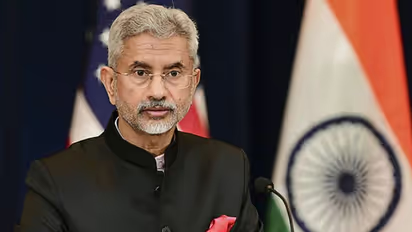'Speak better English': EAM S Jaishankar's witty response on 'what US diplomats can learn from Indians?'

Synopsis
During a recent event in New Delhi, External Affairs Minister Dr S Jaishankar touched upon various aspects of India's identity and diplomatic prowess, but it was his remark on English proficiency that stole the spotlight.
During a recent exchange that captivated the audience at an event in New Delhi, External Affairs Minister Dr S Jaishankar left attendees both applauding and amused with his quick wit and candid response. At an Indian Express event called 'Express Adda', Jaishankar touched upon various aspects of India's identity and diplomatic prowess, but it was his remark on English proficiency that stole the spotlight.
When asked whether he preferred India or Bharat as the name for the country, Jaishankar's prompt and resolute response of "Bharat" resonated deeply with the audience, reflecting a sentiment rooted in India's cultural heritage and historical identity.
"India or Bharat, which name would you prefer any host country to refer as?" Anant Goenka, Executive Director, The Indian Express Group asked.
"Bharat," responded Jaishankar firmly.
However, it was the subsequent question posed that led to a moment of both humour and contemplation. Goenka queried what lesson American diplomats could glean from their Indian counterparts, to which Jaishankar's retort was met with a wave of applause: "Speak better English."
While delivered in a light-hearted manner, Jaishankar's remark underscores a broader discussion surrounding language proficiency and communication skills in diplomacy. English has long been regarded as the lingua franca of international relations, serving as the primary medium for discourse and negotiation on the global stage.
In this context, Jaishankar's emphasis on English proficiency carries significant weight. As India continues to assert itself as a major player in global affairs, mastery of the English language becomes increasingly crucial for effective diplomacy and engagement with the international community.
Meanwhile, during the interaction, S Jaishankar also highlighted the real issue between Indian-China relations. "They are changing, we are changing. How do we find an equilibrium?"
Additionally, he remarked that India's relationship with Russia has remained stable since 1955, contrasting with Moscow's fluctuating dynamics with other major countries over the years. "The issue is how do you explore the relation. In a changed direction of Russia, which is looking away from West and towards Asia, you're finding a new basis to deepen relationship with them," he said.
"Today, it is feasible for India to work on multiple vectors with different nations, finding common connects and creating an agenda. There is a moderation and nuance for each relationship which makes it palatable for others," Jaishankar added.
Stay updated with the Breaking News Today and Latest News from across India and around the world. Get real-time updates, in-depth analysis, and comprehensive coverage of India News, World News, Indian Defence News, Kerala News, and Karnataka News. From politics to current affairs, follow every major story as it unfolds. Get real-time updates from IMD on major cities weather forecasts, including Rain alerts, Cyclone warnings, and temperature trends. Download the Asianet News Official App from the Android Play Store and iPhone App Store for accurate and timely news updates anytime, anywhere.